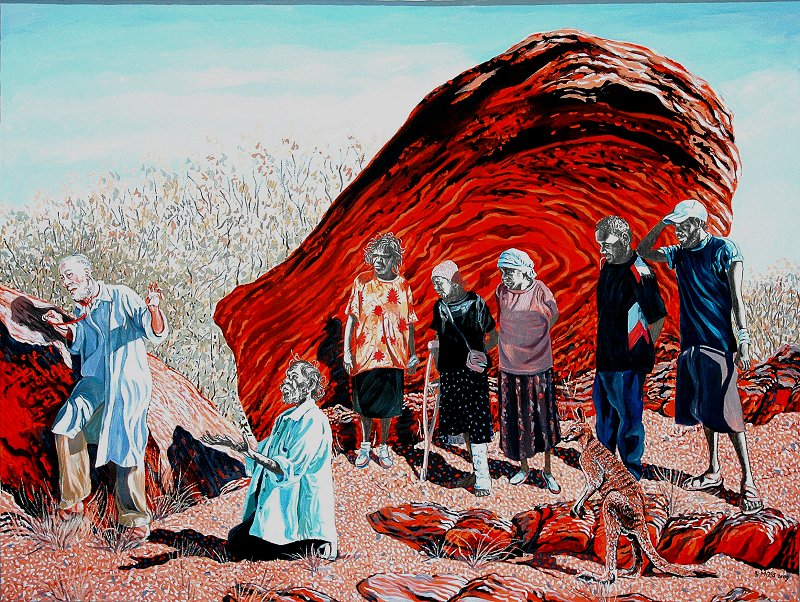In 2010 I worked in an Australian detention centre for short time that felt like a long time. The experience was the worst in my fifty years in Medicine. I signed a confidentiality agreement, sewing my own lips in the process. I saw no atrocity, no wrongdoing, other than torture by impersonal and meandering bureaucracy. Yet the suffering was general; it saw inmates, guards, nurses and doctors all resorting to self-harmful acts. I saw honourable people treating the detained with skill and humanity. I saw them constrained by employers and distrusted and insulted by patients, who felt sure that we too were liars. Yet we did some good. People, whether sick in body or in spirit, were treated with kindness and respect.
For six months after I returned to the mainland I was visited by dreams in which I sat on Tribunals without name, determining the fate of nameless individuals doomed by history and by Australian laws. Captive in these dreams, I doled unequal laws to defeated supplicants. I’d awaken and ask myself, did I really do that? But, inescapably, I knew I was implicated.
My island was a paradise of procedural propriety compared to today’s islands of Nauru and Manus. Doctors and nurses have returned from these places with distressing reports. Some have argued that, knowing what is now known, it is in unethical to work in these places; that the system tortures inmates; that participating is to become complicit in torture. More moderately, all clinicians and observers who return seem to agree that incarceration harms the inmate. The first law of medical ethics being, first do no harm, is not an ethical practitioner obliged to refuse to share in that harmdoing?
A new element affecting the work of a detention clinician is the outlawing of reporting wrongs seen in that work. Offenders face the threat of two years gaol. Nice systematic irony: to protect the liberty of Australians we incarcerate boat people; to protect the integrity of the system we incarcerate truthtellers. Interestingly, the flood of job offers to work in Detention that recruiters used to send to remote doctors such as myself has dried up. Someone, somewhere must have decided Australian clinicians are unreliable.
What then must a nurse or a doctor or a psychologist or a psychiatric nurse do? If offered, may we accept this work? Even if we are forbidden to speak of what we see?
I compare the situation to working with patients in places of dangerous epidemic disease. The first such case I read of was the cholera that broke out in eighteenth century Naples, where a young Swedish doctor left his fashionable private practice in Paris to work with the afflicted. He found himself working alongside a young nurse who was both beautiful and a nun. At any moment the disease might take them. The two work steadily on, afflicted by the losses and by the erotic fever that seizes them both. The drama of the two who risk all for strangers has never left me. The doctor, Axel Munthe, wrote of this in his memoir, The Story of San Michele.
We saw just such heroism played out by Australian nurses and doctors who went to Africa recently to save people from Ebola. We saw it, and -as a nation, as individuals – we prayed for our heroes and we applauded them.
Nothing new here: nurses and doctors work with AIDS, with multi-drug-resistant TB, with Lassa Fever. It is natural to the species to measure the need before the personal risk.
The second precedent is an unhappy one; during the twentieth century doctors working under dictatorships accepted orders, accepted payment, enjoyed promotion and protection, and participated in abuses ranging from imprisoning sane dissenters in psychiatric institutions, to ‘eugenic’ murder, to torture. And being bought, they shut up about it. If clinical ethics learned anything from these abuses it was the imperative to speak out.
In the light of history I see the duty of free citizens, clear and uncomplicated. It is to go to the camps, to do such good work as might be done, and to speak out.

Well spoken Howard. If we remain silent we are indeed complicit
LikeLike
I feel complicit from my time in the Xmas island detention ctre
And I neither did nor saw any wrong act
Just a profoundly wrong policy
I felt filthy
I had guilty dreams for months afterwards
Hg
LikeLike
What would happen if someone who had worked there and signed the confidentiality agreement, spoke up? Would they be arrested, imprisoned?
What a sad, tragic situation Australia has been thrust into.
LikeLike
Yvonne
A government might be foolish to arrest/try a nurse or doc who came, saw, helped and spoke out
They would fear the community would vomit that government out of office
Hg
LikeLiked by 1 person
thank you for a great article, Howard.
Susanne and Ross
______________________________________
In Spain for most of the rest of our trip Ph: +34 67498 8671
>
LikeLike
Great to hear from you doppo
Warmly
Beeg
LikeLike